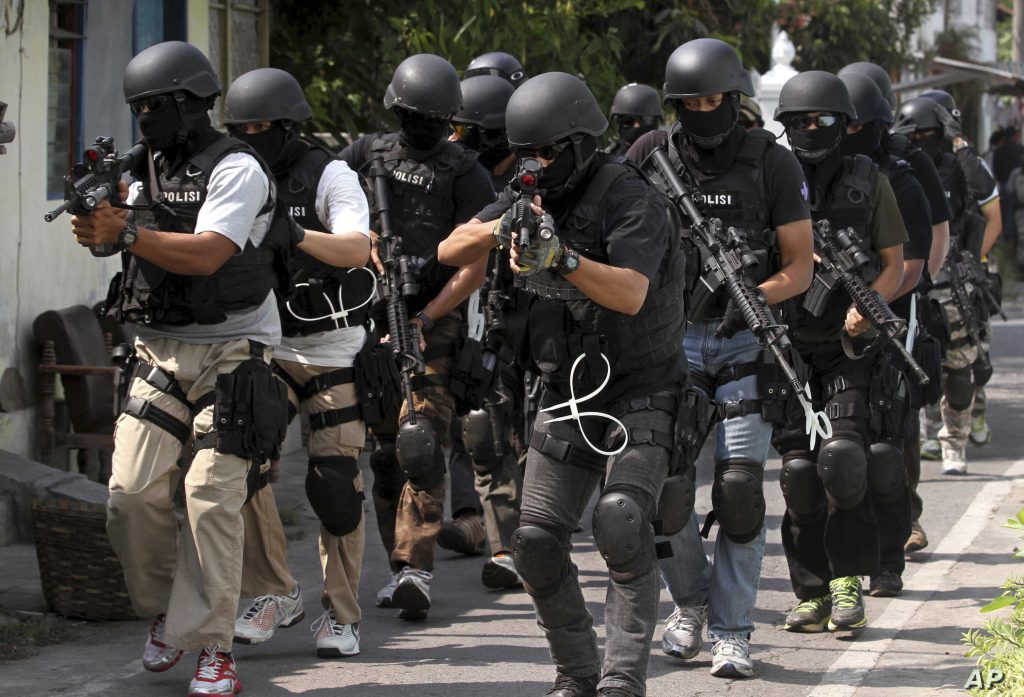Approach to Security-Development Nexus: How Will Indonesia Fight in The War on Terrorism? [English]

Illustration of Densus 88 preparing for a raid on terrorists. Photo: AP
The war on terrorism is a vital challenge for the post-cold war world. Though terrorism is not a new problem, it is problem that has existed for decades and even centuries ago and has transformed into a frightening global threat since the early years of the end of the cold war. Governments in both developed and developing countries are not immune from the threat of the emergence of an international terrorism movement. Moreover, Among the G20 economies, Indonesia is the third fastest growing economy. The latest figures indicate that the per capita gross domestic product (GDP) of Indonesia increased by an average of 4 percent per year between 2000 and 2017. This is only strengthened by China and India, which respectively grew by 9 percent and 5.5 percent per year (Tjoe, 2018).
The economic growth of Indonesia, however, has spurred growing inequality. The Gini index of the world, which calculates inequality from 0 (perfect equality) to 100 (perfect inequality), reflects that the lack of employment in Indonesia and labor absorption has decreased due to income inequality. Although people with high educational qualifications meet the increasing demand for skilled workers, the increase of graduates with higher education sometimes did not meet the requirements in the work field. The fundamental weakness in the war of terrorism is how income inequality in a country affects the actual relative deprivation. Across all households within a society, income could tend to be equivalent, thus suggesting no association at the aggregate level between real relative deprivation and crime. Yet, within that population, an offending peer group may have a slightly higher income that could encourage perceived relative deprivation in others. It implies that in society, economic resources should be equally distributed at the national level.
In the book “why men rebel” by Ted Robert Gurr stated that for violent political movements in general and terrorism in particular, structured poverty and inequality within countries are ‘breeding grounds’. It is no coincidence that the worst forms of collective violence originate in the part of the country that is the most socio-economically deprived. For instance, the increased frequency of bomb attacks carried out almost daily in Nigeria is a mix situation with radical Islam, which promises a better life for martyrs. Moreover, Sope Williams Elegbe, Research Director of The Nigerian Economic Summit Group (NESG) argued that the lack of education and the lack of opportunities in a youth population makes the certain population a potential breeding ground for terrorism. Dialogue of action, communion, and sociopolitical life at all levels of society should be encouraged. These may include linkage of social projects, joint health projects, economic undertakings, etc., to encourage community growth and peaceful coexistence (Agbiboa, 2013). Moreover, social problems will have an impact on system changes that shift social class which causes a security crisis in a country. This means the central government plays a big role to engage with all elements of society especially in including the middle-lower class to formulate a policy that relates to poverty matters. Yitzhaki (1982) stated that uses and gratifications paradox in such a way that the absence of class barriers as reference classes resulted in an increase in the relative deprivation of people in terms of income comparison.
The policies and initiatives of security and development actors operating in conflict- ridden countries have recently become increasingly convergent, believing that the problems facing an insecure country need to be resolved in a comprehensive and interconnected way to achieve sustainable peace and long-term prosperity (Stan, 2004). One of the keys to deal with terrorism in Indonesia is by security-development nexus approach. It means to address important aspects of economic and social policy for the long-run convergence of national elites’ and international agencies’. Democracy assistance is also an effort to focus excessively on human rights protection and design better-informed, more comprehensive conflict management strategies such as terrorism. The absence of integrated national or foreign policies to resolve complex and interlocking socio-economic, environmental, political, security concerns is the overwhelming evidence arising from thematic, program level, and country case studies. The lower middle class such as groups of peasants have been sacrificed to produce industrialization, which makes socio-economic struggles that only side with industry will cause security disturbances.
The state should ensure that every class is a subject of social change, not just an object. Therefore, to create or ratify appropriate policy for industrialization, it needs to be narrowed down. With a substantial reserve of entrepreneurial skills and a well-developed human being for semi- industrialization, correct receiving factor of capital base and commodity prices could be the appropriate formula for achieving labor absorption by output expansion. Instead, without any cohesive policy structure, there is an increasing variety of distinct initiatives, projects, and assistance packages across the broad security-development spectrum. The rhetoric of linked-up policies has nevertheless become axiomatic (International Peace Academy, 2006).
Bibliography
Egiegba Agbiboa, D. (2013). Living in fear: religious identity, relative deprivation and the Boko Haram terrorism. African security, 6(2), 153-170.
International Peace Academy. (2006). (Rep.). International Peace Institute. http://www.jstor.org/stable/resrep09516
Stan, F. (2004). The Security-Development Nexus: Conflict. Peace and Development in the 21st Century. New York: IPA Report.
Tjoe, Y. (2018, August 28). Two decades of economic growth benefited only the richest 20%. How severe is inequality in Indonesia? The Conversation. https://theconversation.com/two-decades-of-economic-growth-benefited-only-the- richest-20-how-severe-is-inequality-in-Indonesia- 101138#:~:text=However%2C%20Indonesia’s%20economic%20growth%20spurred,from %2030.0%20in%20the%201990s.
Yitzhaki, S. (1982). Relative deprivation and economic welfare. European Economic Review, 17, 99–113.
Dhea Sarah is currently working as a Media Relations Intern at INDEF and teaching assistant at the Department of Public Policy and Management UGM. She can be found on Instagram with the username @dheasarah.





